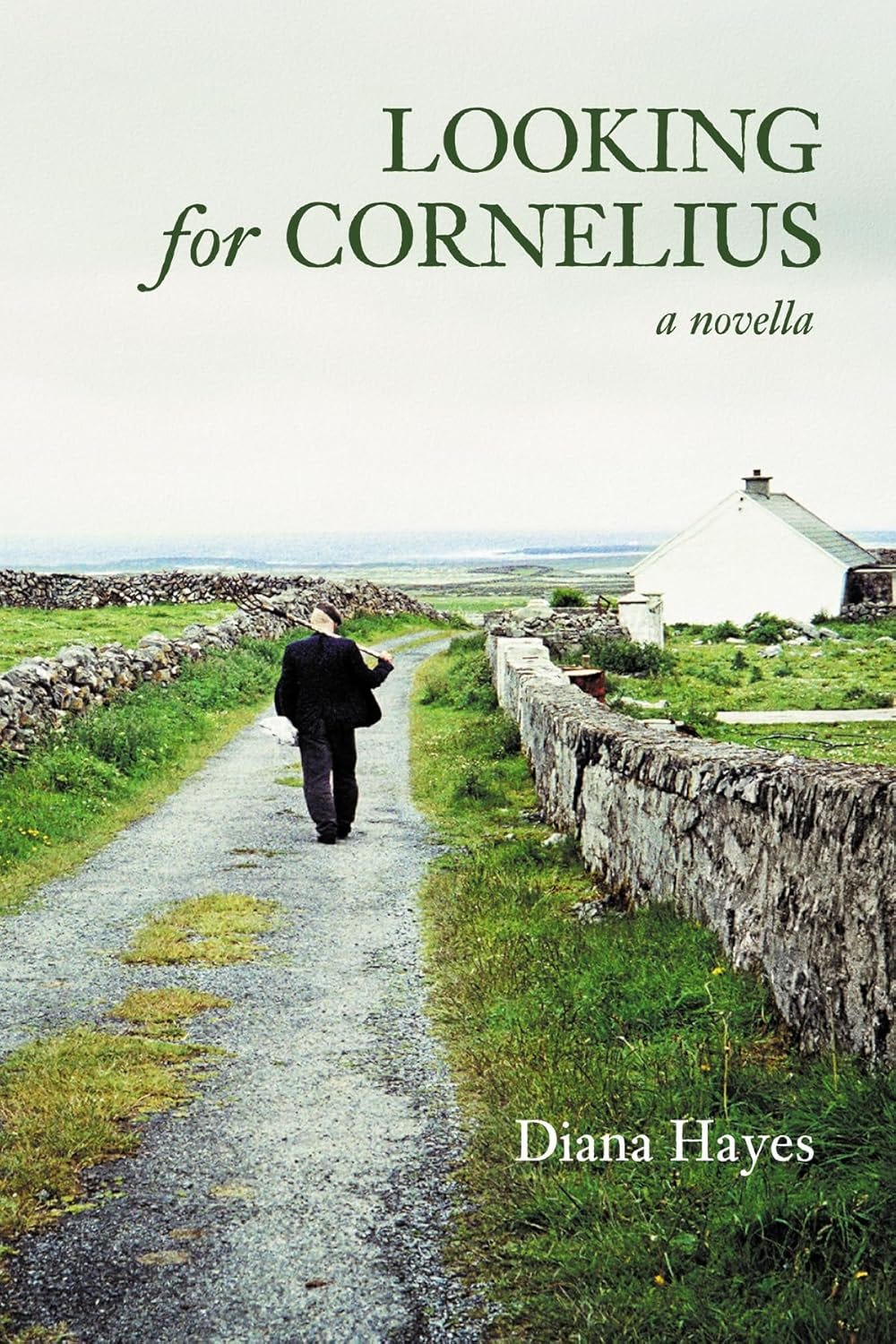Looking for Cornelius: a Novella by Diana Hayes
Reviewed by Cynthia Sharp
The Art of Poetic Layering in Fiction
Diana Hayes, a Salt Spring Island photographer, poet and author, as well as the founder and owner of Raven Chapbooks, just had her new novella Looking for Cornelius released by Wipf & Stock/Resource Publications. Her enticing cover image leads the way into the lush mossy green of Ireland and a rhythmically engaging, enlightening story where she unveils the discovery and affirmation that come with self-trust, inviting readers into a magical realm where hope is still possible. Relying on intuition, the right to leap toward all that calls, main characters Deirdre Ó hAodha, a Montreal music teacher, and her twelve-year-old fiddle student Éamon O’Connor manifest family, history and belonging on their adventure to Cork, Ireland’s summer festival in the hopes of Éamon’s audition preemptively securing him a spot in Cork University’s music program to become available to him after his high school graduation.
“Hayes’s attention to detail as both a poet and a novelist combine to evoke a literary landscape where individual and collective subconscious propel the plot as much as the surface action.”
Hayes’s attention to detail as both a poet and a novelist combine to evoke a literary landscape where individual and collective subconscious propel the plot as much as the surface action, evoking “the stories within the stories.” Deirdre encourages Éamon to pay attention to his dreams, both literally and figuratively, a catalyst to the protagonists ascending beyond the constrictions of a Montreal life salted with poverty and misguided notions of practicality in which the arts can often be disregarded as secondary or luxury, to the realization that prescience is the answer. In addition to traditional studying techniques like review, memorization and breaking components down into manageable parts to help Éamon prepare for exams, Deirdre invokes an honest quest of awakening in both of them. In this way, Hayes’s theme subverts doubt to embody the notion that everyone has the right to autonomy, to direct their time into their talent in a balanced, meaningful life. With visions as valuable as Deirdre’s great-grandfather Cornelius’s journals which guide her through revelations of family connections and personal gifts, as well as landmarks steeped in history dating back to 1100 BCE like Drombeg stone circle, the Druid’s altar, the main characters steadily articulate their lives with the resonance of subconscious truths as they travel, Deirdre sharing her personal verse about St. Kevin with Éamon, along with cherished works like those of Seamus Heaney and Tagore. In this way threads of the past and present fuse together as the pair make their way toward Cork.
The alliteration of the opening section “Fiddles and Fire” grabs readers instantly, drawing them to the intertextuality of quotes from Hayes’s poem “Notations on a Map” with reference to famine ships and genes in Part 1 and the complexity of “Going Home” in Part 2: “Do we distill to passion/ after centuries of loss?/ Is this our new language,/ the knowing field?” Lyrical lines go soothingly into the body of the reader as Hayes references her own poems, mystical greats like Rumi and a myriad of Irish and international writers from Mary Jane O’Donovan Rossa who composed “Song of Freedom” in New York after fleeing her homeland, to contemporary scientist Joyce Whiteley Hawkes who published “Cell-Level Healing,” the quotes thematically tying genes to cells in paradoxical liberation.
Irish rocks and roots stir the power of place in cultural reconnection, like nutrients through malnourished bodies. Celtic texture intertwines with existentialism as regular people, moments, and memories holistically transcend fear with a dash of epiphany. When the protagonists journey from Dublin to the Valley of the Glen of the Waterfall, for example, Deirdre invokes the name in her mother tongue, “Gleann Scáth an Bháis,” as she and Éamon recall similar lines echoed in a Psalm. Hayes’s well-woven research and description become a visual haven transporting readers to a quietly divine dimension where there’s time for anyone who dares to follow in the footsteps of Éamon and honour their passion as a means to security: “the prospect of this once-in-a-lifetime chance to make his music known, to take it out into the world, to make it his life and his living.”
In one concise novella, Looking for Cornelius blends mythology with current-day adventure in character arcs that are multi-layered completions of coming home—home to culture, land, DNA, family and self—to looking up and realizing one is found, that fate is the knowing of calling in the presence of the ancestral support always with us. Like Éamon O’Connor performing an audition where “the sounds were deeply his own,” Hayes invites readers to that intrinsic part of self and beyond where essence seeps back to the surface, where poetry sings and humans listen.
About the Author
Diana Hayes was born in Toronto and has lived on the east and west coasts of Canada. She received her BA (UVIC) and MFA (UBC) in creative writing, studying with the Irish poets John Montague and George McWhirter. She has published seven books of poetry, most recently Sapphire and the Hollow Bone, Gold in the Shadow, and Labyrinth of Green. She has lived on Salt Spring Island since 1981. For more information, visit dianahayes.ca.
About the Reviewer
Known as Canada’s Mary Oliver, Cynthia Sharp is the Writers International Network Vancouver Poet Laureate. She’s the author of Ordinary Light, a first-prize winner in the Sunshine Coast Writers and Editors Society Book Awards for BC Authors, as well as in the International Impact Book Awards in Sustainability and Contemporary Poetry. She also penned Rainforest in Russet and The Light Bearers in the Sand Dollar Graviton. Her fiction, poems, creative nonfiction and reviews can be found in many literary journals including CV2, untethered, The Miramichi Reader, The Pitkin Review and Prism and have been nominated for the Pushcart Prize and Best of the Net Anthology.
Book Details
paperback ISBN: 979-8-3852-5033-2
ebook ISBN: 979-8-3852-5035-6
$21CDN, $15US | 148 pages






